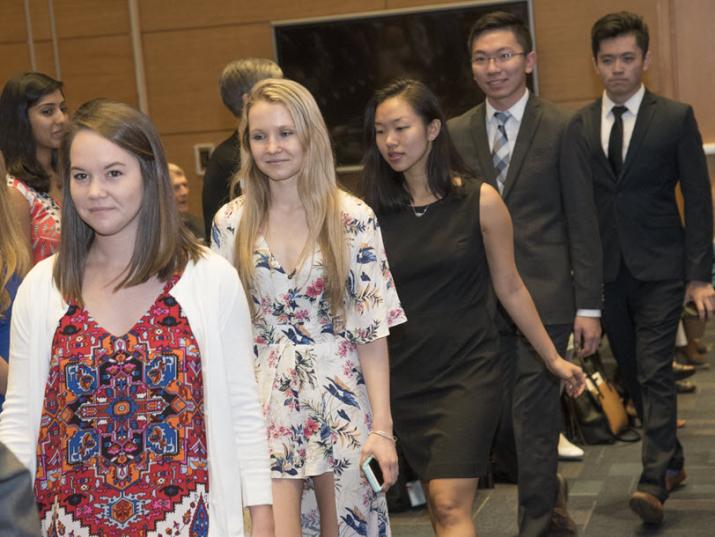
Graduating students take their seats at the beginning of the commencement ceremony. Photo credit: Duke Photography.
Published May 15, 2017 under Education News
Last Friday, the Duke Global Health Institute (DGHI) celebrated commencement with 60 global health undergraduates.
Fifty-six of the graduates majored in global health and four graduates completed Program II studies in areas including global health. Program II is an interdisciplinary program of study designed by individual students to meet their unique academic and intellectual goals.
Twelve students graduated with distinction in global health—that is, they demonstrated academic excellence through the successful completion of a substantive written project evaluated by a faculty committee.
DGHI Director Welcomes Graduates and Guests
DGHI director Michael Merson opened the ceremony, welcoming the graduates and their guests. He noted that this graduating class is the first class to have entered Duke after the global health major was established in 2013.
“You have a potential with the knowledge and experience you now have to make a meaningful impact in the world,” he said, “and we need you now more than ever.
Faculty Speaker: Saving the World Is Work that Takes Time
David Toole, associate professor and director of undergraduate studies, gave the commencement address. Sharing a few students’ reflections on their global health fieldwork, he noted that global health work often requires unexpected investments in time or changes in plans—or even “doing nothing”—which he encouraged students to honor.
“We don’t tell students they can’t save the world,” he said. “Instead, we send them out into the world they want to save.”
Later, he added, “You might have to learn how to knit, or to practice the virtue of doing nothing, because … saving the world is work that takes time. Or, as one of you put it so wonderfully, work that requires unforeseen time investments.”
Student Speaker Shares Leadership Lessons
This year’s undergraduate commencement speaker, global health and cultural anthropology major Sofia Caballero Stafford, reflected on her early global health inspiration in high school, when she visited Guatemala with Girl Up, a United Nations program. It was during that trip that she began to more deeply explore the question, “What tools do girls need to empower themselves and overcome barriers that stand in the way of their dreams?”—a question that still guides her work today.
Sharing leadership lessons she learned as a global health major, Stafford encouraged her classmates to practice empathy, to embrace failure as an inevitable part of the path to achieving a goal, and to be humble.
In closing, she said, “I would like to urge us all not to lose the capacity to be shocked by injustice in the world, to ask ourselves every day what duty we have to create the enduring conditions in which all people are healthy and safe, and to lean on the people sitting in this room to help us do that.”
About Stafford
Throughout her time at Duke, Stafford concentrated her studies in adolescent girls’ health and development and worked closely with Eve Puffer, assistant professor of psychology and neuroscience and global health. She was a research assistant to Puffer and, under Puffer’s mentorship, she completed an independent study that focused on a family-based therapy intervention and validating mental health assessment tools in Kenya.
Stafford was also a member of the Puffer Lab team that won the 2016 Duke STEAM Challenge with their proposal to develop a mobile tech support tool alongside a family based therapy intervention in Eldoret, Kenya.
While at Duke, Stafford held internships with Innovations in Healthcare and the Public Health Institute. She also interned at the Saving Lives at Birth Grand Challenge at USAID’s Center for Accelerating Innovation and Impact, where she’ll return this summer for six months through the Global Health Fellows Program.


